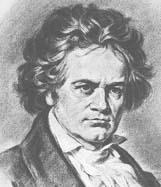
Ludwig van Beethoven
German, (1770-1827)


Ludwig van Beethoven was born in 1770 in Bonn, Germany. For the most part, the early years of his life were dark and depressing. His father was a singer in the court chapel. This seems to have been an ideal background; but it was quite the contrary. His father was an alcoholic, and would maltreat and abuse his son's precocity and talent. In fact, there are a great many stories about Beethoven's father waking him early in the morning and forcing him to practice the piano, though whether or not this is true is anyone's guess.
This would continue for roughly nineteen years! In 1789, because his father had lost his position (I think), young Ludwig was essentially forced to support his family. He studied with the composer, Christian Gottlieb Neefe, under whom it is believed he composed his very first pieces. Of all pieces that were written then, the one that got the most attention was a funeral cantata for the death of the Holy Roman Emperor, Joseph II. Because this work had apparently appealed to so many people, arrangements were made for Ludwig to study with Wolfgang Amadeus Mozart in Vienna. To my knowledge, Beethoven had first met and performed on the piano for Mozart in 1787, though incidentally, Mozart had severely criticized him, saying he was worthless (this may be incorrect-I can't find the resource). Unfortunately, Mozart died in 1791, preventing him from teaching Ludwig. By the next year, he was studying with an equally brilliant composer; Franz Joseph Haydn. However, Ludwig found him to be an ineffective teacher, and even remarked- "I had never learned anything from Haydn". This does not mean that Haydn was incompetent, but rather, to me, implies that Ludwig was in no need of further instruction.
Meanwhile, Ludwig was performing in public, particularly for the aristocrats, and having his work published.
Under Construction


MIDI's
Note: I do not take credit for making any of these Midis. If I do know who make them, however, that person's name will be next to the hypertext link. To my understanding, these midis are Public Domain files. But if you decide to link them to another site, please give credit to the person who made them. DO NOT give all of the credit to me, I am merely publicizing the work of others.
Overtures
Coriolan Overture in C Minor, Op. 62--Beethoven Depot
Piano Sonatas
Three Sonatas, Opus 2 (Dedicated to F. J. Haydn, 1795/96)--Beethoven Depot
Sonata in F Minor, Op. 2, Number 1 (Complete) Unknown
This is Beethoven's first piano sonata. It is very interesting, particularly in the tonality of the second subject (in A-Flat). The pastoral beauty of the second movement, in F Major, is worth noting. Overall, this piece ranks in difficulty with the average Haydn piano sonata.
Sonata in A Major, Op. 2, Number 2 (Complete)
Sonata in C Major, Op. 2, Number 3 (Complete)
My personal favorite Op. 2 sonata. Based on sightreading, I think this one is very fun to play. The first movement, in particular, is very energetic, though I recommend that only players with large hands try this one.
Sonata in E-Flat Major, Op. 7 --Beethoven Depot
Three Sonatas, Opus 10--Beethoven Depot
Sonata in C Minor, Op. 10, Number 1
Sonata in F Major, Op. 10, Number 2
Movement 1
Movement 2
Movement 3
Sonata in D Major, Op. 10, Number 3
Sonata in C Minor, Op. 13, "Pathetique"--Beethoven Depot
Sonata in C-Sharp Minor, Op. 27, "Moonlight"--Beethoven Depot
Sonata in C Major, Op. 53, "Waldstein"--Beethoven Depot
Sonata in G Major, Op. 79 (Complete)
Sonata in B-Flat Major, Op. 106, "Hammerklavier"
Movement 1
Movement 2
Movement 3
Movement 4
Sonata in A-Flat Major, Op. 110 (Complete)
Sonatina in G Major (Complete)
String Quartets
Op. 18, Number 1, in F Major-Alan Wood
Movement 1: Allegro con brio
Op. 96, in F Minor, "Serioso"-Alan Wood
Movement 1: Allegro con brio
Movement 2: Allegretto ma non troppo
Movement 3: Allegro assai vivace ma serioso
Movement 4: Larghetto espressivo-Allegretto agitato
Symphonies--Beethoven Depot
Note: these files are HUGE! Rest assured, these are well worth the wait! So, unless you want to wait a while to open and hear these, I suggest you save them to your hard disk.
Symphony Number 1 in C Major, Op. 21
I think this is one of Beethoven's best symphonies. It's themes are fresh and inspired, and the symphony, as a whole, is very uplifting.
Movement 1-- Adagio molto-Allegro con Brio
Movement 2--Andante cantabile con moto
Movement 3--Menuetto (Allegro molto e vivace)
Movement 4--Adagio-Allegro molto e vivace
Symphony Number 2 in D Major, Op. 37
Movement 1--Adagio molto-Allegro con Brio
Movement 2--Larghetto
Movement 3--Scherzo & Trio: Allegro
Movement 4--Allegro molto
Symphony Number 3 in E-Flat Major, Op.55, "Eroica"
This symphony was not well-received at its premiere in 1803. I enjoy listening to this symphony, but its length is somewhat daunting.
Movement 1--Allegro con Brio
Movement 2 --Marcia funebre : Adagio assai
Movement 3 --Scherzo & Trio : Allegro vivace
Movement 4--Allegro molto
Symphony Number 4 in B-Flat Major, Op. 60--Michael A. Abelson
Movement 1--Adagio-Allegro vivace
Movement 2--Adagio
Movement 3--Menuet: Allegro vivace-Trio:Un poco meno allegro
Movement 4--Allegro, ma non troppo
Symphony Number 5 in C Minor, Op. 67
Movement 1--Allegro con brio
Movement 2--Andante con moto - Piu moto
Movement 3--Allegro
Movement 4--Allegro - Presto

This page hosted by  Get your own Free Home Page
Get your own Free Home Page
![]()
![]()